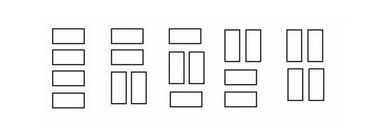zoj zju 2994 Tiling a Grid With Dominoes 状压dp
We wish to tile a grid 4 units high and N units long with rectangles (dominoes) 2 units by one unit (in either orientation). For example, the figure shows the five different ways that a grid 4 units high and 2 units wide may be tiled.

Write a program that takes as input the width, W, of the grid and outputs the number of different ways to tile a 4-by-W grid.
Input
The first line of input contains a single integer N, (1 <= N <= 1000) which is the number of datasets that follow.
Each dataset contains a single decimal integer, the width, W, of the grid for this problem instance.
Output
For each problem instance, there is one line of output: The problem instance number as a decimal integer (start counting at one), a single space and the number of tilings of a 4-by-W grid. The values of W will be chosen so the count will fit in a 32-bit integer.
Sample Input
3
2
3
7
Sample Output
1 5
2 11
3 781
#include<stdio.h>
#include<string>
#include<iostream>
#include<map>
#include<string.h>
#include<algorithm>
using namespace std;
int dp[1200][20];// 1表示 需要下一行一个位子
int okling(int z)//判断z状态 是否 0 都是连续成对出现
{
int flag=0;
int yiyi=3;
for(int i=0;i<3;i++)
{
if(((z>>i)&yiyi)==0)
{
z|=(yiyi<<i);
}
else if(!(((z>>i)&yiyi)==3||(((z>>i)&yiyi)==1&&i!=2)))
return 0;
}
return 1;
}
int ok(int z1,int z2)//左边列状态z1 右边列状态z2 可以匹配返回1
{
for(int i=0;i<4;i++)
{
if(((z1>>i)&1)==1&&((z2>>i)&1)==1)
return 0;
else if(((z1>>i)&1)==1)
z2=(z2|(1<<i));
}
if(okling(z2))
return 1;
else
return 0;
}
int find(int wei,int m)//wei 这行 满足 wei+1行状态m的方法数。
{
int ans=0;
for(int i=0;i<16;i++)
{
if(ok(i,m))
ans+=dp[wei][i];
}
return ans;
}
void init()
{
memset(dp,0,sizeof dp);
dp[0][0]=1;
for(int i=1;i<=1000;i++)
{
for(int j=0;j<16;j++)//本行
{
dp[i][j]+=find(i-1,j);
}
}
}
int main()
{
int t;
int cas=1;
int n;
int op;
init();
scanf("%d",&t);
while(t--)
{
scanf("%d",&n);
printf("%d %d\n",cas++,dp[n][0]);
}
return 0;
}